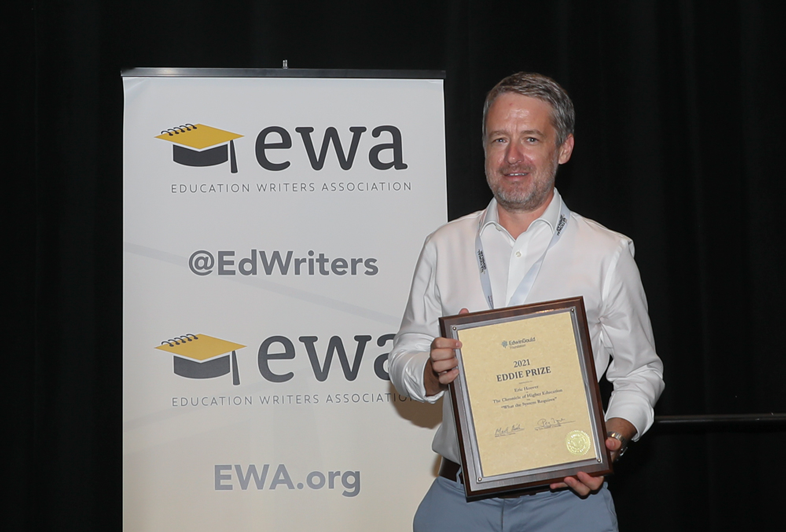The Education Writers Association is pleased to announce the winner of the ninth annual Eddie Prize, the journalism award from EGF Accelerator that recognizes the best work on the challenges low-income students face getting into and completing college.
The 2021 winner of the Eddie Prize is Eric Hoover of The Chronicle of Higher Education.
“The COVID-19 pandemic laid bare longstanding inequities in opportunities and access to high-quality postsecondary education,” said Peg Tyre, EGF Accelerator’s director of strategy and education. “The outstanding reporting honored this year shows the power of journalism that demands transparency and accountability that can help spur meaningful reforms that ultimately help more disadvantaged students find successful paths to, and through, college.”
The winner of the Eddie Prize, which comes with a $7,500 cash award, was announced during EWA’s 75th National Seminar on Sunday, July 24, 2022. The winner also receives a bowler hat, a tribute to the namesake of the EGF Accelerator, Edwin Gould, who in his lifetime was often photographed wearing that iconic hat.
Hoover’s entry consisted of two deeply reported and nuanced accounts of students navigating the complexities and bureaucratic hurdles that encumber the college journey for millions of students.
In Escaping Oblivion, Hoover followed a Kenyan refugee who dreamed of college in America but needed extensive help to reach his goal. For The Most Onerous Form in College Admissions, Hoover looked at the human toll on students who must complete an intensive — and some would argue, invasive — survey in order to qualify for financial aid at most higher education institutions.
As one of the Eddie Prize judges noted, Hoover “clearly learned a lot about his subjects, but his storytelling craft really drove home with riveting urgency the problems with getting financial aid, especially by those who need it the most.” Another judge noted that Hoover’s reporting “broadens and deepens our understanding of what those barriers even are by spotlighting rarely examined — and also central — challenges.”
The judges, all working journalists, selected the winner and two finalists from 20 applicants. The entries were evaluated for ingenuity of reporting and trenchant analysis that uncovers, highlights or furthers the discussion about the challenges low-income students face, and problems or conditions related to their efforts to obtain a degree. Special attention was paid to works that bring to life aspects of the issue that may not have previously come to the attention of the public.
The finalists for this year’s Eddie Prize were:
Casey Parks, The New York Times Magazine
From the Judges: “The story was written with devastating detail, deep analysis, and sharp synthesis. Casey’s characters are complex and compelling — and make readers care about the condition of rural schools like those in Holmes. It brings new attention to the critical challenges facing rural communities and the educational aspirations of its residents.”
Megan Pauly, Sara McCloskey, David Streever, Elliott Robinson, Connor Scribner, Crixell Matthews, Travis Pope & Benjamin Dolle, Virginia Public Media
“Dreams Deferred”
From the judges: “Vicious cycle of transcript fees — the system creates the outcomes it wants. By charging lower-income students and students of color, the schools are sending a message on their values. VPM did an excellent job demonstrating the negative and the positive.”
The EGF Accelerator invests in programs that inspire young people to achieve their personal best while contributing to a stronger, more compassionate society. Its mission is to reduce the achievement gap by empowering motivated yet underserved students through support of programs that provide academic remediation, enrichment, and leadership life skills resulting in their entrance to and graduation from college.
